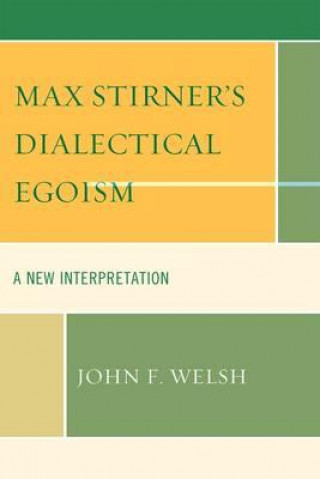
Kód: 04903496
Max Stirner's Dialectical Egoism
Autor John F. Welsh
Max Stirner (1806-1856) is recognized in the history of political thought because of his egoist classic The Ego and Its Own. Stirner was a student of Hegel, and a critic of the Young Hegelians and the emerging forms of socialist a ... celý popis
- Jazyk:
 Angličtina
Angličtina - Vazba: Pevná
- Počet stran: 304
Nakladatelství: Lexington Books, 2010
- Více informací o knize

4190 Kč

Skladem u dodavatele v malém množství
Odesíláme za 10-14 dnů
Potřebujete více kusů?Máte-li zájem o více kusů, prověřte, prosím, nejprve dostupnost titulu na naši zákaznické podpoře.
Přidat mezi přání
Mohlo by se vám také líbit
-

MetaMAUS
670 Kč -

This is Goya
561 Kč -

Walden
223 Kč -

Breaking Into Japanese Literature
497 Kč -

EVANGELIO DE PROMETEO,EL
677 Kč -

Lisan Al Arab Fi Masarib Al Adab Al Insha' Wal Rasa'il
829 Kč
Darujte tuto knihu ještě dnes
- Objednejte knihu a zvolte Zaslat jako dárek.
- Obratem obdržíte darovací poukaz na knihu, který můžete ihned předat obdarovanému.
- Knihu zašleme na adresu obdarovaného, o nic se nestaráte.
Více informací o knize Max Stirner's Dialectical Egoism
Nákupem získáte 419 bodů
 Anotace knihy
Anotace knihy
Max Stirner (1806-1856) is recognized in the history of political thought because of his egoist classic The Ego and Its Own. Stirner was a student of Hegel, and a critic of the Young Hegelians and the emerging forms of socialist and communist thought in the 1840s. Max Stirner's Dialectical Egoism: A New Interpretation examines Stirner's thought as a critique of modernity, by which he meant the domination of culture and politics by humanist ideology. In Stirner's view, "humanity" is the supreme being of modernity and "humanism" is the prevailing legitimation of social and political domination. Welsh traces Stirner's thought from his early essays to The Ego and Its Own and Stirner's responses to his critics. He also examines how Benjamin Tucker, James L. Walker, and Dora Marsden applied Stirner's dialectical egoism to the analysis of (a) the transformations of capitalism, (b) culture, ethics, and mass psychology, and (c) feminism, socialism, and communism. All three viewed Stirner as a champion of individuality against the collectivizing and homogenizing forces of the modern world. Welsh also takes great care to dissociate Stirner's thought from that of the other great egoist critic of modernity, Friedrich Nietzsche. He argues that the similarities in the dissidence of Stirner and Nietzsche are superficial. The book concludes with an interpretation of Stirner's thought as a form of dialectical egoism that includes (a) a multi-tiered analysis of culture, society, and individuality; (b) the basic principles of Stirner's view of the relationship between individuals and social organization; and (c) the forms of critique he employs. Stirner's critique of modernity is a significant contribution to the growing literature on libertarianism, dialectical analysis, and post-modernism.
 Parametry knihy
Parametry knihy
Zařazení knihy Knihy v angličtině Society & social sciences Politics & government Political science & theory
4190 Kč
- Plný název: Max Stirner's Dialectical Egoism
- Podnázev: A New Interpretation
- Autor: John F. Welsh
- Jazyk:
 Angličtina
Angličtina - Vazba: Pevná
- Počet stran: 304
- EAN: 9780739141557
- ISBN: 0739141554
- ID: 04903496
- Nakladatelství: Lexington Books
- Hmotnost: 612 g
- Rozměry: 158 × 232 × 21 mm
- Datum vydání: 15. September 2010
Oblíbené z jiného soudku
-

Postmodern Prince
1025 Kč -

The Clash of Civilizations and the Remaking of World Order
286 Kč -

Prince
172 Kč -

Prince
200 Kč -

The Social Contract
185 Kč -

Strategy of Conflict
887 Kč -

Oxford Handbook of Modern Diplomacy
1314 Kč -

On Tyranny
286 Kč -

Captive Mind
357 Kč -

Hope In The Dark
306 Kč -

Common Sense
276 Kč -

Analysis of Robert D. Putnam's Bowling Alone
227 Kč -

The Politics Book
534 Kč -

Anarchism and Other Essays
251 Kč -

How to Run A Government
303 Kč -

Administration of Fear
311 Kč -

Two Books of the Elements of Universal Jurisprudence
360 Kč -

Culture of National Security
1192 Kč -

Open Conspiracy
701 Kč -

Conspiracy Theories
265 Kč -

Oxford Handbook of Political Economy
1257 Kč -

Discourses on Livy
276 Kč -

Coup d'Etat
757 Kč -

Revolutions In Reverse: Essays On Politics, Violence, Art, And Imagination
393 Kč -

Communist Manifesto
302 Kč -

Analysis of Hans J. Morgenthau's Politics Among Nations
227 Kč -

Destined for War
470 Kč -

God and the State
226 Kč -

Dialectic of Enlightenment
747 Kč -

The Principles of Political Economy and Taxation
357 Kč -

Analysis of Max Weber's Politics as a Vocation
254 Kč -

Biggest Secret
484 Kč -

So You Want to Talk About Race
244 Kč -

Divided
276 Kč -

Rationalism in Politics & Other Essays
344 Kč -

Twenty-First Century Socialism
344 Kč -

Price of Inequality
410 Kč -

The Culture of Fear (Revised)
369 Kč -

Oxford Handbook of National Security Intelligence
1869 Kč -

Retrotopia
509 Kč -

Machine Learning For Kids
752 Kč -

Bourgeois Equality
724 Kč -

Fashion and Politics
1318 Kč -

Ronald Reagan
1286 Kč -

Case for Nationalism
625 Kč -

States Versus Markets
1365 Kč -

American Politics: A Very Short Introduction
249 Kč -

Prince - Special Edition with Machiavelli's Description of the Methods of Murder Adopted by Duke Valentino & the Life of Castruccio Castracani
358 Kč -

Chaos and Complexity Theory in World Politics
6638 Kč
Osobní odběr Praha, Brno a 12903 dalších
Copyright ©2008-24 nejlevnejsi-knihy.cz Všechna práva vyhrazenaSoukromíCookies


 Vrácení do měsíce
Vrácení do měsíce 571 999 099 (8-15.30h)
571 999 099 (8-15.30h)